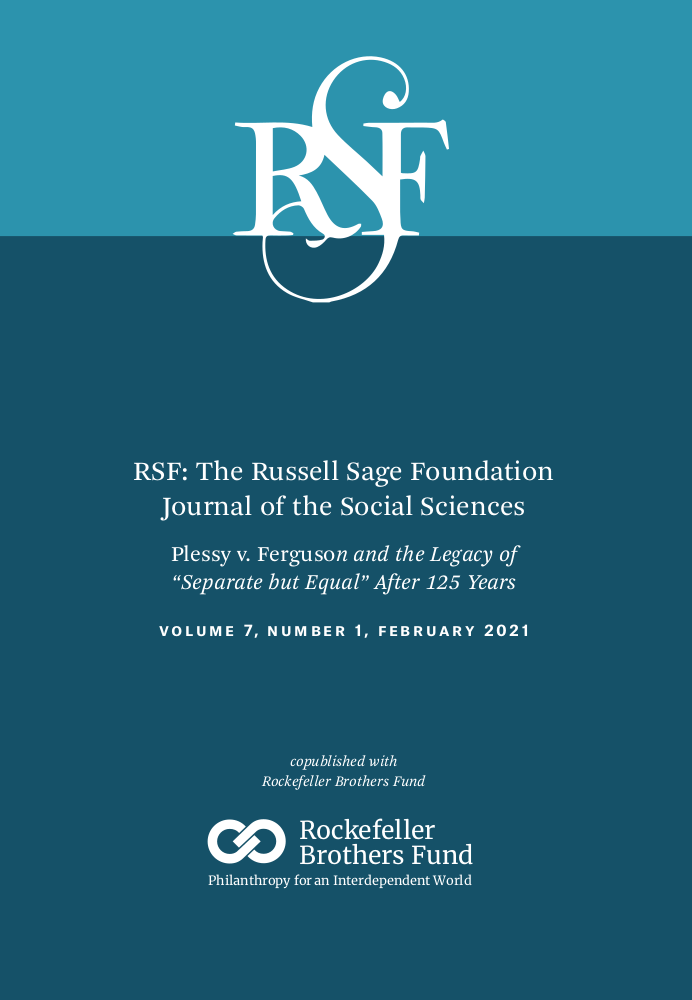With implications for Biden administration’s efforts to address systemic racism, the studies examine and propose solutions to address racial inequities in American education, housing and rule of law
NEW YORK: In Plessy v. Ferguson and the Legacy of “Separate but Equal” After 125 Years, Professors Susan T. Gooden (Virginia Commonwealth University), john a. powell (University of California, Berkeley) and Samuel L. Myers Jr. (University of Minnesota) provide new legal and quantitative analysis of state-sanctioned racial oppression in America, drawing connections between the Supreme Court’s landmark approval of racial segregation and persisting systemic racism in present-day America. The new journal, published by the Russell Sage Foundation, was released Wednesday, February 17.
Following the nationwide protests launched by Black Lives Matter in response to the brutal murder of George Floyd last year, Gooden, powell and Myers bring together leading academics for a ground-breaking look at the realities of state-sanctioned racial segregation in America. Researchers who contributed to the journal share new findings about the ripple effects of Plessy v Ferguson on racially biased policing, the government’s role in the development and perpetuation of segregated neighborhoods, the connection between Plessy v Ferguson and modern voter suppression laws and how the legacy of racialized tracking perpetuates educational segregation.
Although many Americans are taught in school that the landmark civil rights case Brown v Board of Education righted the wrongs of Plessy v Ferguson, Gooden, powell and Myers find that in fact the long tail of the Supreme Court’s decision 125 years ago forms much of the legal and public policy basis of systemic racism in contemporary America.
Drawing from data on police-involved homicides in large police departments in the United States from 2013 to 2017, Tia Sherèe Gaynor (University of Cincinnati), Seong C. Kang (New Mexico State University) and Brian N. Williams (University of Virginia) find a positive correlation between segregated communities, the percentage of black people in a population and the number of police killings of black people. Thomas J. Davis (Arizona State University) proposes how, by reforming U.S. law to recognize the basic personal autonomy of individuals to define, redefine, and express their individual identities, America can help address one of the most persistent, insidious legacies of Plessy v Ferguson. Douglas S. Reed (Georgetown University) finds that the Supreme Court’s use of “colorblind principles” in recent education-related cases stands in sharp contrast to empirical evidence demonstrating the efficacy of color-conscious pedagogies within schools.
The journal includes the following articles:
-
“The Law and Significance of Plessy,” which exposes the embeddedness of structural racism in the American legal system and the slow work done to untangle racism from the law. Author: john a. powell (University of California, Berkeley)
-
“‘Separate, Therefore Equal’: American Spatial Segregation from Jim Crow to Kiryas Joel,” which examines modern spatial segregation in America and calls for legal reforms to protect the ability of minority communities to segregate spatially. Author: Shai Stern (Bar-Ilan University).
-
“Plessy’s Legacy: The Government’s Role in the Development and Perpetuation of Segregated Neighborhoods,” which shows how urban renewal programs caused the destruction of African American communities across the U.S. Author: Leland Ware (University of Delaware).
-
“Confronting the Legacy of ‘Separate but Equal’: Can the History of Race, Real Estate, and Discrimination Engage and Inform Contemporary Policy?” which uses case studies of two Ohio community-based initiatives to demonstrate the positive impacts of using historical records of discrimination to inform contemporary real estate development policies. Author: Jason Reece (Ohio State University).
-
“Legacies of Segregation and Disenfranchisement: The Road from Plessy to Frank and Voter ID Laws in the United States,” which explores how voter ID laws further the dismantling of voting rights and the promises of full political engagement for racial minorities, especially African Americans. Authors: Paru Shah (University of Wisconsin-Milwaukee) and Robert S. Smith (Marquette University).
-
“Does the Negro Need Separate Schools? A Retrospective Analysis of the Racial Composition of Schools and Black Adult Academic and Economic Success,” which finds, contrary to the conventional wisdom, it is not unambiguously the case that black students gain from attending schools with more white peers. Authors: Timothy M. Diette (Washington and Lee University), Darrick Hamilton (The New School), Arthur H. Goldsmith (Washington and Lee University) and William A. Darity Jr. (Duke University).
-
“Separate and Unequal Under One Roof: How the Legacy of Racialized Tracking Perpetuates Within-School Segregation,” which finds a 1 point increase in the percentage of black eleventh and twelfth graders in advanced math courses increases the likelihood that an academically eligible black student will take an advanced math course before they graduate by 22 percentage points in racially diverse schools. Authors: Danie V. Francis (University of Massachusetts, Boston) and William A. Darity Jr. (Duke University).
ABOUT THE EDITORS
Susan T. Gooden is dean and professor of public administration and policy at the L. Douglas Wilder School of Government and Public Affairs at Virginia Commonwealth University.
john a. powell is Robert D. Haas Chancellor’s Chair in Equity and Inclusion, professor of law, African American studies, and ethnic studies, and director of the Othering & Belonging Institute at the University of California, Berkeley
Samuel L. Myers Jr. is Roy Wilkins Professor of Human Relations and Social Justice at the Hubert H. Humphrey School of Public Affairs at the University of Minnesota, United States.
ABOUT THE RUSSELL SAGE FOUNDATION
The Russell Sage Foundation is the principal American Foundation devoted exclusively to research in the social sciences. The Foundation is dedicated to strengthening the methods, data, and theoretical core of the social sciences as a means of improving social policies. The Foundation is a research center for a select group of Visiting Scholars each year, a funding source for studies by scholars at other academic and research institutions, and an active member of the nation’s social science community. The Foundation also publishes, under its own imprint, the books and a journal, RSF, that derive from the work of its grantees and Visiting Scholars.
Media Contacts
Dean Pearce, dean.pearce@berlinrosen.com, 630-723-7490
Maya Solarana, maya.solarana@berlinrosen.com, 402-957-3395
###





